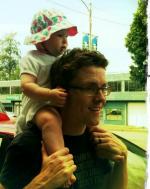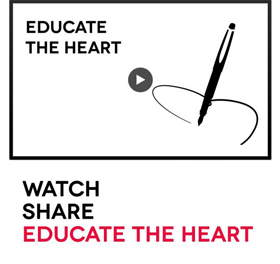Heart-Mind 2013: Connecting the Dots

By Matt Clarke
When my wife was pregnant with our first child three years ago, someone said to me, “Kids are great! The only way to change them is to change yourself.”
 When I first heard that, it struck me as a profound truth, and yet still felt a bit abstract and opaque, due largely to my lack of real world parenting experience. But as our daughter, Coco, grows up faster than I would like, and as we have now welcomed a second little human into our clan, the truth of that statement is glowing brighter and brighter in my mind everyday. They may be the wisest words I have yet heard about parenting.
When I first heard that, it struck me as a profound truth, and yet still felt a bit abstract and opaque, due largely to my lack of real world parenting experience. But as our daughter, Coco, grows up faster than I would like, and as we have now welcomed a second little human into our clan, the truth of that statement is glowing brighter and brighter in my mind everyday. They may be the wisest words I have yet heard about parenting.
It’s a bit of a cliché to say that we all eventually turn into our parents, but it’s another thing watching that process unfold, first hand, from the other side. I see so much of myself in my daughter: her eyes, her sense of humour, her mannerisms… her temper. Every day I see her watching me and it’s not in a way that I have ever experienced before. She’s not just observing. She’s not judging me, forming any opinions about what I’m doing. Or who I am. She is simply watching, unconditionally… and absorbing every minute detail. She’s connecting dots, registering emotions with behaviors. Everything I do she takes to heart. Sometimes I swear I can actually see the neurons connecting in her brain. It’s amazing and terrifying all at the same time.
Every now and then, when I’m visibly stressed or frustrated or angry, Coco will look at me and ask, “Daddy, are you happy?” This question is essentially rhetorical, because there’s really only one answer. There’s no way to look a beautiful, innocent toddler in the eye and earnestly say, “No, I’m not happy because I’m worried about paying these bills.” It’s absurd. And so, I always smile and say, “Yes, Coco, I am happy.” And I mean it, sincerely. How can you not be happy when you are looking into the eyes of a miracle? And this makes her happy. And I have an epiphany. I realize that I spend so much time worrying about my children and whether or not they are happy, and if they will grow into happy people. It’s really all that matters to me in the end. I really don’t care if she’s a doctor or a plumber, married or single, just so long as she is happy. And her biggest concern is whether or not I am happy. My happiness makes my child happy.
That was a pretty big realization. It reversed everything I thought I knew about parenting. It took the emphasis off her. It took the emphasis off what she’s doing, how she’s behaving and whether or not that’s okay. These things are still important, obviously. She needs to be respectful, considerate of others, patient, etc. But these lessons are much more effective if they are reinforcements of the example I am setting. That’s where it starts.
THE CONFERENCE
The Heart-Mind 2013 Conference was presented by the Dalai Lama Center for Peace and Education in Vancouver on May 9, 10 & 11. The theme of the conference was “How Mindfulness Helps Children Thrive.” The moment I learned about this conference I was excited. I have seen the benefits of meditation and mindfulness practice in my own life and in people around me, so, naturally, I am interested in passing these lessons onto my kids. Of course, I am still very much a student in these subjects, so I was looking forward to hearing from some of the experts on the matter.
The conference opened on Thursday evening with a keynote address by Dr. Clifford Saron. Dr. Saron has done an astonishing amount of research into the benefits of meditation practice. He explained his work with The Shamatha Project, the most comprehensive study of the effects of meditation practice to date. It was an enticing mixture of fascinating, inspiring and brain stretching. I won’t lie and say I was able to wrangle my layman’s brain around everything Dr. Saron covered, but, to be honest, it didn’t really matter. His presentation deepened my mystical appreciation for the wonder that is our minds, our bodies and the power of a seemingly simple meditation practice. His work, by shedding more light on the science of the brain is in turn shedding more light on the magic of the universe.
Dr. Saron’s intellect heavy talk was a fitting start to what proved to be a superbly balanced weekend. My mind, heart, body and spirit were all stimulated over the three days.
Friday morning started with Goldie Hawn, who left little question in anyone’s mind of why she is such a star. She is magnetic. She took to the stage and not once looked at a note or even neared the podium. She just spoke from her heart and oozed charm. I would have challenged any cynic to not be totally engaged with her by the end. And so it gave me great hope that she is using her superpowers of charisma to champion such a great cause as mindfulness in children. It seems like such a daunting task to get something like her Hawn Foundation’s Mind UP program integrated into schools, but they are doing it with great success, and after hearing Goldie’s speech, it’s easy to see why.
After that, things really settled into their groove. Maria LeRose proved to be the perfect moderator. She is effortlessly intelligent and on the ball and was able to really give a lot of context to the speeches. She’s a natural speaker, easily commanding the room, but she also has a kindness and a relatable nature that put me at ease and drew me in. I felt like she was my voice or my advocate as an audience member.
Paul Tough was a great highlight of the conference. I was really looking forward to his talk. I had heard a bit about Paul, and the work behind his book, “How Children Succeed,” on a radio program back in the fall. I was totally fascinated by this new approach to education, putting the emphasis on character strengths over cognitive skills and IQ. As a parent, I thought, “Yes, this is the kind of stuff I want to learn about. This is the stuff that will benefit my kids.” He proved to be a deeply engaging speaker and I was not disappointed. It was especially interesting to learn about how detrimental stress can be on a child and how the greatest antidote to it is a strong attachment. Isn’t that a wonderful truth? Love is the antidote.
One of my favourite moments was when Rob Roeser played an interview with Herbie Hancock where Herbie recounted a concert he was playing in Miles Davis’ band. The band was really in a groove and Miles was playing a killer solo. Then Herbie said he played a chord on his guitar and it was just wrong; out of tune, or out of key or something. He said Miles stopped for a moment and proceeded to play something that made Herbie’s chord right. The interviewer asked how Miles did that? Herbie said that Miles didn’t hear the chord as wrong; he heard it as different and as an impulse to move in a new direction. That was a beautiful lesson that echoed a major theme of the conference for me: how we view what’s going on around us is far more important than what is actually going on around us.
The conference closed Saturday with a keynote address by Shawn Achor. Shawn’s speech really touched a lot of people, as was made clear by the standing ovation he received at the end of it. He talked about happiness and how we have it in the wrong position in our order of things. Conventional wisdom says that we work hard, become successful, and then we’re happy. But the problem, says Shawn, is that the marker for success is always moving. Once you accomplish one goal, another one appears, so in essence you never really get to that final stage – the happy stage. So the trick is to change the order and focus on happiness first. Then the rest will happen naturally. The data and studies he showed to back this theory up were very convincing, and I left feeling a strong desire to implement this paradigm shift in my own life.
TAKE AWAY
I took a lot of lessons and new wisdom with me from this conference. For a start, it’s very important to emphasize the word “practice” in “mindful practice.” It takes time. It takes practice. We take some steps forward, then some back. We step away and then step back. But if we keep coming back to it, eventually we get better and we see the results. But there is great value in introducing this practice at an early age. If it can become a normal part of the next generation’s life, something that becomes second nature, then who knows the long-term implications it will have on our children, our societies and the world as a whole. There is great hope in this simple practice.
I think another big realization was that we are always teaching our children more than one lesson at a time. If my daughter draws on the walls or breaks something, for example, I might look at that as an opportunity to teach her the importance of respecting people’s things. But while I am dealing with her, I am also teaching her about patience, understanding, kindness and forgiveness. Or, I may be teaching her the opposite, depending on how I handle it.
Which leads me to my biggest lesson. I realized that my interest in this conference was actually more selfish than I originally thought. I thought this conference would be a place where I would learn new things to help my children, new things to teach them. And while that was definitely a part of it, I’ve realized the greater value is in what I learned for myself. How can I be more mindful? How can I nurture compassion and loving-kindness in my own heart, in my own life? How can I be a better parent by being a better person? Adele Diamond said it best when she said, “Children learn what they know.”
Because in the end, I can tell my children all sorts of things, I can give them things to do, things to work on, rules to follow. But no matter what I say, no matter what I teach them, they will still be watching me. Absorbing every minute detail. Connecting the dots.
Matthew Clarke is a Vancouver-based filmmaker, songwriter, musician, writer, father of two awesome children, and a proud out -of- league husband. His latest short web-series, "Convos with my two year old," has become an internet sensation in it's first season and is available on YouTube .
https://www.youtube.com/user/ConvosWith2YrOld







Comments
Post new comment